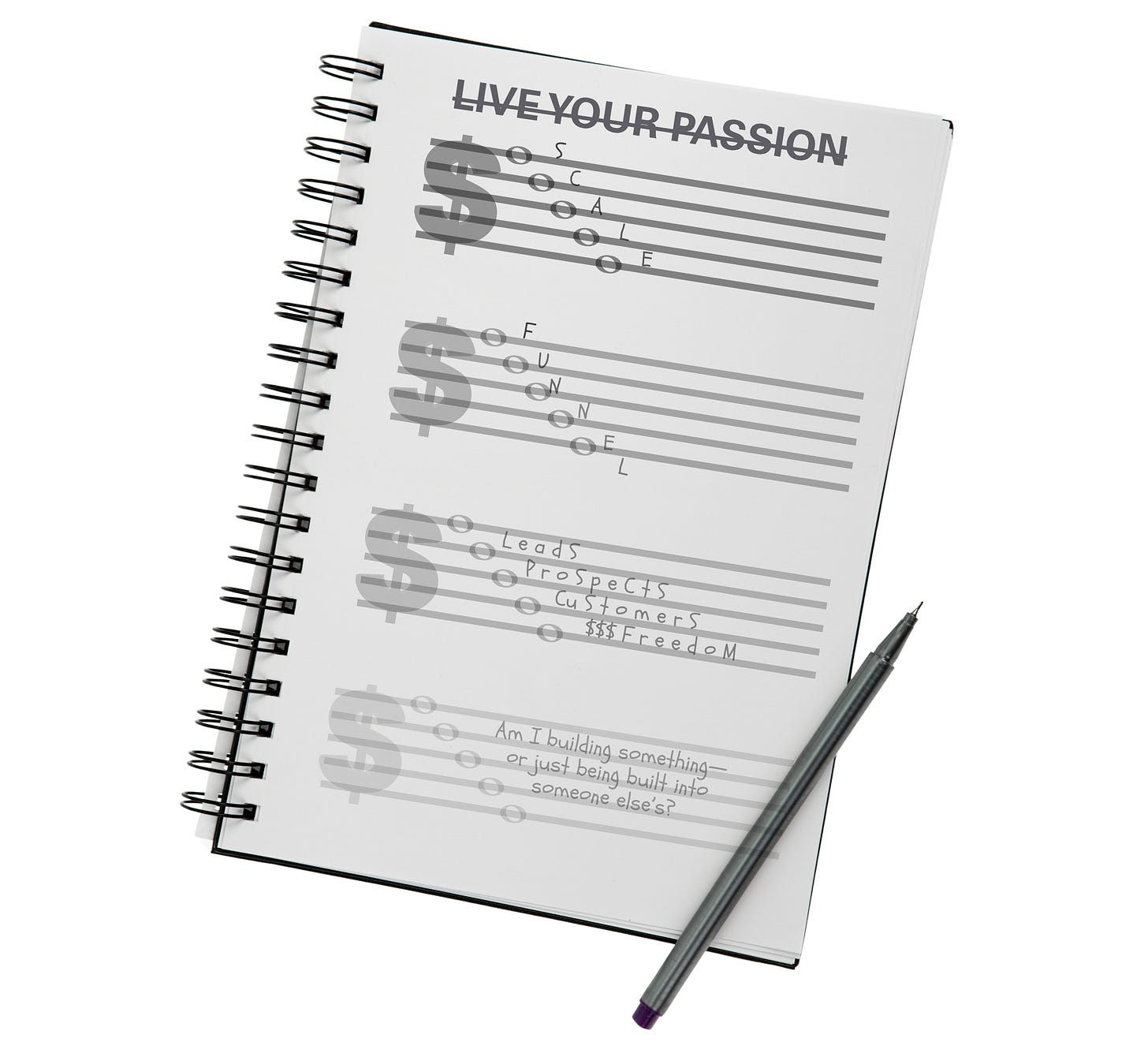Structure // Hype: Why Most Music Business Workshops Won’t Save You—And What Might
🎛️ “Financial Freedom” always comes with a funnel. But what happens when the music staff spells SCALE and FUNNEL instead of Do Re ME? Or when your voice turns into someone else's funnel?

🎙️ What Most Music Business Workshops Miss
And why “diversification” alone won’t save your income—OR your voice!
In recent years, well-meaning programs have exploded across the music industry—and the rest of the performing arts at large.
Workshops now promise everything from personal branding and sync licensing to mindset, curriculum, entrepreneurship, and studio scalability.
And sure… some are better than others.
It’s progress!
We’ve finally acknowledged what many of us have long known:
🎭 You can’t just perform your way into sustainability anymore.
Not in this economy. Not in this industry. Not without real structure.
But here’s the harder truth:
Most of these music business workshops—just like the school curriculum changes we’re supposed to want—still won’t save you!
In fact, some of them were created by people who’ve proven that they too can’t perform their way to sustainability—so they need to sell you a workshop instead!
Imagine having two broken legs…
and instead of going to the hospital, you go and learn CPR.
That’s kind of like what you’re getting a little too often with these workshops.
Some may be well-intended—but too much of the actual income generated comes in the form of another line on someone’s CV for promotion and tenure.
Even some respected education nonprofits or conferences seem to mainly teach entrepreneurship as if charisma, Canva, and a fancy payment kiosk are all you need.
Then there are other workshops that amount to not much more than performative efforts by companies or institutions trying to look like they’re “doing the work”… while continuing to profit off of artists’ underpaid labor.
And then there are the “Erl King-style” workshops—designed to lure you into a fancy sales funnel. What starts as an affordable opportunity to learn a new skill or gain a new insight can turn into an aggressive sales pitch for unnecessary studio gear, expensive coaching containers, MLMs for silver SOVT straws, or some other “passive” income stream you never knew you needed—because you don’t.
We’ll cover all this and more.
Because what most artists need isn’t more exposure, more academic theories, more performative justice, more KPI slides, or more workshop buzzwords.
What most artists really need is ACTUAL DURABLE INCOME—and the infrastructure it requires.
The kind of income that won’t collapse when the gigs slow down.
The kind that doesn’t require a personality transplant to maintain.
Let’s break down what’s missing.
Because just like how college curriculum alone won’t guarantee a career, many of the professional development workshops out there won’t help you build what a real business model requires.
And many more?
They’re just sleek sales funnels waiting to upsell you.
They might spark ideas, but they rarely fix the deeper structural barriers that prevent sustainable income—like the kind that can actually pay your rent.
🔹 1. Most Workshops Don’t Teach How to Build a Structurally Sound Income Model
They’ll tell you to “diversify” your income—
and then leave you hanging with how to actually make the actual income.
What most don’t tell you is how to generate income that can stabilize you or keep you from needing to get a second “day job” or to drive Uber all night, every night.
They may mention “multiple sources of income” and “super brand clarity,” but it doesn’t always go much beyond acting like mastering Spotify and Youtube are supposed to be tickets to financial freedom.
Maybe they’ve gotten around to telling you to offer Patreon or Substack subscriptions, which I and others have found to be better for creators growing a brand.
Otherwise, talks about multiple income streams might get you a “financial literacy” lecture from a wannabe Dave Ramsey guru who’ll tell you how you need to “just be more financially literate” with that $150 honorarium...
“Treat your money like you treat your craft…”
“Own your artistry by owning your finances…“
(WOW! I’m finally financially FREE!)
But at least if you can save $50 from that $150, it might grow to $56 in two years; you might even get a $2.25 dividend check. It’s “life-changing passive income”—if you pick the right stocks!
Now… let’s listen to the sound of the rent check bouncing in G major!
There’s a reason all this financial literacy talk rings hallow and we can’t stop rolling our eyes. Because unless you’re already making six figures or you have a stable job and stable home life to where saving enough of anything you make is practical, being told what a Google search could tell you about Roth IRAs and index funds won’t make a difference.
The deeper agenda too often is that the guru teaching the “workshop” is really just hoping someone in the audience has a high net worth that can be assimilated into their assets under management (AUM). They’re fishing for clients—not your actual financial well being.
Most financial literacy workshops leave out the whole part about how you first need to already have enough actual income regularly coming in!
It’s not that artists are financially illiterate—it’s that we’re already counting every damn penny. We’re actually more financially literate than many of the people who claim we’re not—but they won’t pay us enough to prove it!
And this kind of tone-deafness lands especially hard on those who’ve been conditioned to equate worth with access and visibility—not with income.
It’s part of why so many artists internalize scarcity as if it’s a rite of passage. And it’s why so many of these business workshops are just aesthetic distractions from the deeper structural crisis.
We don’t need to “fix” artists.
We need to fix the income models we’ve been handed—
and stop pretending you can budget your way out of a broken pipeline.
Instead of asking how to “diversify” your income, let’s ask better questions:
Which income streams are structurally viable for your actual temperament?
How do you stack income in a way that doesn’t leave you on edge every month?
What is the business model that can transcend time-for-money burnout?
Without any of that, all they’ve sold you is a prettier hamster wheel—
And if you get off, you’ll just fall…
Eventually into another “Financial Freedom” funnel.
🔹 2. Most Workshops Ignore the Role of Stakeholders and Ecosystems
Most music business workshops treat artists like solo economic units—expected to “build a brand,” chase followers, perfect their content, and close high-ticket sales on a discovery call that some stranger scheduled based on your “perfect” ad campaign.
But artists don’t thrive in isolation.
They thrive in ecosystems—
with donors, collaborators, strategic partnerships, and structural support.
Here’s what else most workshops miss:
Donors aren’t just patrons—they’re potential stakeholders in your business model.
Institutions don’t have to just be audition-gated—they can function as accelerators. They can incubate revenue models, not just reputations.
Outreach isn’t just charity—it can generate revenue, if designed with reciprocity in mind.
These aren’t fantasies.
They’re underleveraged structures hiding in plain sight—
especially in spaces where prestige is often treated as a substitute for pay.
(And if you’ve ever wondered why singing a tiny role at a big opera house feels better on the resume than a title role at a theatre closer to home, you’re staring straight at some of the mythos we have to dismantle.)
Artists don’t just need access.
Artists need infrastructure that redistributes visibility, value, and validation in ways that actually hold.
Too many of these workshops keep musicians trapped in survival gig-mode—selling themselves one project at a time, with no structural leverage.
But the truth is:
You can create your own economy.
One that doesn’t depend on external gatekeepers, but redistributes opportunity and reward through reciprocal design.
In a future post—hopefully next month—I’ll be exploring more of what this could look like at the institutional level—especially for legacy artistic companies who have prestige they can use to act as economic ecosystems, and not just be gig employers.
Because if we want the arts to survive, it’s not just about training better performers. It’s about building better economic structures around them.
If the industries keep rewarding prestige over pay, and fantasy over function, we’ll keep producing third fairy covers for the press release—instead of developing more Violettas who can pay their rent and fund their future.
🔹 3. Workshops Skip Personalized Diagnostics
Exposure usually isn’t the problem.
Misalignment usually is.
There’s no MRI for your income patterns—
That’s why I built one.
What’s keeping most artists stuck isn’t a lack of opportunity, or a weak brand, or even “imposter syndrome.”
It’s that the internal wiring of their business model—if there even is one beyond just a kitchen sink full of hope—doesn’t match their personal behavior around money.
Most workshops don’t (and can’t) diagnose that.
They can’t tell you why you keep lowering your rates every time someone flinches.
They can’t explain why your numbers look good in Excel, but not in the sales pitch.
They can’t help you understand why you may show up confidently for others, but still hesitate when it’s your turn to ask for an appropriate payment.
Because that’s not about your strategy.
It’s about your internal economy—
the psychology, structure, and behaviors shaping how you earn.
And while workshops can introduce ideas or start conversations, they’re not built to pinpoint your unique collapse patterns.
They’re not going to notice how your nervous system affects your sales process. Nor how your unique belief system or childhood core wounds show up every time you try to send a proposal.
You need more than a pep talk.
You need 1:1 recalibration.
You need structural honesty.
You need someone who can offer an MRI for your actual income behaviors, help you stop performing your business—and actually build one that fits.
Otherwise, you’re just playing musical chairs with new tactics—
hoping that the next trend or tool finally fixes the misfire underneath.
Until you unpack your internal economics, you’ll keep shapeshifting to fit models that were never made for you.
Workshops can give you ideas.
They can spark change.
But they alone can’t fully fix your income and why it won’t stabilize.
And until that gets addressed, all the branding and positivity in the world won’t help you hold what your nervous system, structure, and income behaviors are still rejecting.
🔹 4. Workshops Center Specific Skills and Equipment Over Business Ownership
Pitching is a skill.
But it’s not the business.
And yes, workshops can be a great place to build courage, test messaging, and sharpen delivery.
But it's a whole other story when the session quietly becomes a predatory sales pitch—for a fancy mic you don’t need, a mixer you won’t use, or a gear bundle that's “marked down” just in time for them to get an affiliate kickback. Or worse yet, they try to upsell you a $25K mentorship experience with a total stranger who has that one celebrity friend who was in one movie and claims to have industry connections!
That’s not education. That’s extraction.
It’s monetized proximity disguised as mentorship.
The real issue isn’t whether you learn how to present yourself or use new tools. It’s whether you come out the other side with actual ownership of your path.
Too many music business workshops still reinforce the legacy pipeline:
Get good → Get noticed → Get hired.
And if it doesn’t work?
Try a “Music Career Workshop” next:
Get a “real job” → Keep studying → Keep auditioning → Keep going… until burnout feels normal.
But that pipeline is built on passive permission.
It trains you to perfect the craft—while someone else controls the checks.
It teaches you to polish your bio—without ever building the system that makes your income durable, sovereign, and yours.
That’s not how you build power. That’s how you stay dependent.
So when you leave a workshop, ask:
👉 Did I just buy another tactic—or did I build real traction?
👉 Do I now own an offer, a process, or a path to consistent revenue?
👉 Or did I just collect tools to keep working for free, waiting for the gig that "changes everything"?
Business ownership begins when you start structuring for it—not just studying for it.
And that doesn’t come in a slide deck.
It comes in recalibration.
Workshops can teach tactics.
Mentorship can build infrastructure.
Funnel ≠ Foundation.
Workshop ≠ Ownership.
🧨 The Workshop Model Was Never Meant to Hold You
There’s an entire business and coaching culture built around this formula:
FREE or “low-ticket” workshop, webinar, or “challenge”…
→ Shiny transformation promises (“6-figure studio with 6 group classes!” or “You can scale to a million by letting us do all the hard work for you!”)
→ Funnel into a “high-ticket” program—with zero diagnostic on whether the business model even fits your life and how you best operate.
It’s not just one person doing it.
It’s an entire industry—The “Workshop Industrial Complex.”
You know you’ve seen these kinds of copy:
“Learn the secrets to a wide umbrella of profit as an artist.”
“Unleash your studio's 6-figure premium power teaching <16 hrs/week!”
“Autopilot with the new ‘Music Teaching Collaboration Method’ and scale BIG!”
“Master Spotify. Master Passive Income. Master Your Lifestyle!”
“Succeed just like Jewel without ever living in your car!”
Sound familiar?
Some call it “bro-marketing.”
Others rebrand it as “empowerment.”
But this isn’t Cinderella being saved—
it’s her stepmother selling you the glass slippers for a needless mark-up…
and coercing you to thank her for the opportunity.
Underneath all the affirmations and stylized testimonials, most of these programs still operate like legacy gatekeeping—except now the gate is a high-ticket coaching container. And most will gladly take any form of payment—they may even offer “coach financing” at an interest rate that makes you forget the Financial Literacy Workshop from earlier.
What’s always missing?
A structural audit of your income behavior
A personalized roadmap that doesn’t collapse your nervous system
Permission to reject the funnel if it wasn’t built for your creative architecture

So What’s Needed Instead?
NOT another 5-day challenge.
NOT a bigger funnel hack.
NOT a more expensive microphone.
It’s this:
Personalized mentorship
Structural clarity
A business model that integrates your unique artistry, psychology, and financial reality
You don’t need more likes and followers.
You need a system that holds.
You need an income model that doesn’t require self-abandonment to survive.
You need a voice-aligned economy.
Not just a new social media strategy.

Why the Right Mentors Matter More Than Ever
We need more 1:1 mentoring—and fewer recycled workshops and funnel formulas.
If you’ve read The Referral List I Wish School Had Given You, you already know:
I don’t recommend people because they’re popular.
I recommend them because their systems work.
These mentors aren’t selling a performance.
They’re helping to build infrastructure.
And they more than meet my Five Standards of Economic Integrity.
Because artists don’t need more polished branding.
They need structurally grounded, ethically aligned mentorship—
the kind that helps them build (or rebuild) from the inside out—not from the pedestal down.
Especially now that:
Institutions are collapsing
Donors are fatigued
And the market keeps pushing shiny hype over sustainable structure
The right mentor won’t hand you a playbook.
They’ll help you architect a business model that’s actually yours.
Check out the post if you haven’t already:
AND THE STANDARDS ARE CLEAR:
As noted in the previous post:
ANY entrepreneur, business owner, or leader who is ready to operate at a higher level can start by simply evaluating how their work abides by these five principles:
Structural Integrity
They’ve built something that works in the real world—not just in a funnel or on a landing page. Their pricing, packaging, and delivery model are aligned, and their backend supports their promise in tangible ways. Their offers meet clients’ actual needs—without bait and switch.Behavioral Congruence
They embody what they claim. They lead without performing—or bullying. They don’t rely on emotional closeness, blurred boundaries, political or social allegiance, curated mystique, or coercive control to keep the business going.Business Delivery
They deliver real outcomes, as promised—not just temporary feelings. Clients walk away with clarity, transformation, and tools or systems that deliver actual results. They’re offering a healthy horse, not just a cart before the horse.Referrals Without Reciprocity
They recommend people because they’re excellent—not because they’re in a clique or are expected to return the favor. They build trust—not echo chambers.Absence of Sales & Marketing Exploitation
They don’t rely on shame, guilt, urgency theatrics, manipulation, trauma triggers, unrealistic promises, deceptive funnels, inflated income claims, or aspirational bait. Clients never have to override their instincts, dismiss their intuition, abandon their standards, or second-guess their self-respect in order to say yes.Share this list. Screenshot it. Save it.
Let’s raise the bar—quietly but firmly—for everyone.
No need to name names.
No need to point fingers.
Just let the standards do the talking.—THIS is how we can really start to change the economy for the better!

You’re Not Here to Become Someone Else’s Funnel.
And if you abide by the above standards—you won’t be pulled into one either.
You’re here to build a system that holds.
Without the burnout.
Without the performance.
And without the cost of pretending everything’s fine when it’s not.
Because the artist economy isn’t just a brand.
It’s a structure we get to build back better—together.
PS - Here’s a Great “Workshop” Idea You Can Do RIGHT NOW!!!
JUST READ ALL MY ARTICLES!!!
(And implement the ideas that resonate!)
I mean it!
Much of what I’ve written will be more valuable and require less time—and aside from occasional offers of my services, there’s no awkward sales pitch you have to smile and nod through.
And if you’re new to following me, below is a run down of some business posts from the past couple of years that you may find helpful for your business or artistic career RIGHT NOW!
(And you’ll find even more on my other page!)

PS - If Something in This Post Resonated…
And you're seeking deeper alignment or support—
here’s a brief overview of how I might be able to help:
If you’re ready to:
• Undo the high-pressure “bro-marketing” habits baked into your business
• Starve the “starving artist” mindset that keeps you attracting the wrong clients
• Build a congruent structure to fuel your next level of self-actualizing success—or—
If you:
• Run a business
• Manage a high-performance team
• Lead a legacy-focused planning firm
• Direct an academic program
• Shape an artistic institution—and you're seeking next-level clarity, curriculum recalibration, strategic design, or discreet consulting—
Let’s talk—here or on LinkedIn.
Because the systems that hold wealth, trust, and talent—
should be designed to quietly endure.





















